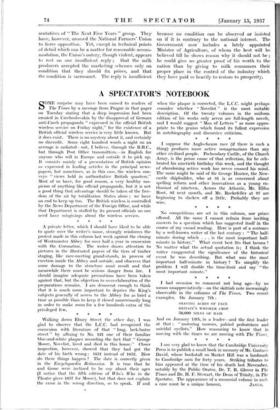A SPECTATOR'S NOTEBOOK
SOME surprise may have been caused to readers of The Times by a message from Prague in that paper on Tuesday stating that a deep impression had been created in Czechoslovakia by the disapproval of German anti-Czech propaganda " expressed in the official British 'wireless service on Friday night," for the existence of a 'British official wireless service is very little known. But it does exist. There is no mystery about it, and certainly no discredit. Some eight hundred words a night on an average is radiated—not, I believe, through the B.B.C., 'but through Post Office transmitters,—in English for anyone who will in Europe and outside it to pick up. It consists mainly of a presentation of British opinion as expressed in leading articles in the principal news- papers, but sometimes, as in this case, the wireless con- veys " views held in authoritative British quarters." Most of us have, for good reason, a very healthy sus- picion of anything like official propaganda, but it is not a good thing that advantage should be taken of the free- dom of the air by totalitarian States alone ; we have an end to keep up too. The British wireless is controlled by the News Department of the Foreign Office, and while that Department is staffed by its present officials no one need have misgivings about the wireless service.
A private letter, which I should have liked to be able to quote over the writer's name, strongly reinforces the protest made in this column last week against the closing of Westminster Abbey for over half a year in connexion with the Coronation. The writer draws attention to pictures in the illustrated papers of the tiers of timber staging, like race-meeting grand-stands, in process of erection inside the Abbey and outside, and observes that some damage to the structure must result and that meanwhile there must be serious danger from fire. I should imagine adequate precautions have been taken against that, but the objection to over-elaboration of the preparations remains. I am democrat enough to think that it is much more important to deprive the King's subjects generally of access to the Abbey for as brief a time as possible than to keep it closed unnecessarily long in order to make room for a few hundreds extra of the privileged few.
* Walking down Ebury Street the other day, I was glad to observe that the L.C.C. had recognised the connexion with literature of that " long, lack-lustre street " by affixing to No. 121 one of their familiar blue-and-white plaques recording the fact that " George Moore, Novelist, lived and died in this house." Closer inspection, however, showed that they had got the date of his birth wrong : 1851 instead of 1852. How do these things happen ? The date is correctly given in the Encyclopaedia Britannica. It is true that he and Gosse were inclined to be coy about their ages (I notice that the fifth edition of Who's Who in the Theatre gives 1857 for Moore), but that does not explain the error in the wrong direction, so to speak. If and when the plaque is *corrected, the L.C.C. might perhaps consider whether " Novelist " is the most suitable description. Of the twenty volumes in the uniform edition of his works only seven are full-length novels, and I would suggest " Man of Letters " as more appro- priate to the genius which found its fullest expression in autobiography and discursive criticism.
I suppose the Anglo-Saxon race (if there is such a thing) produces more active nonagenarians than any other civilised people. Prebendary Carlile, of the Church Army, is the prime cause of that reflection, for he cele- brated his ninetieth birthday this week, and the thought of abandoning active work has never crossed his mind. The same might be said of Sir George Hunter, the New- castle shipbuilder, who at 91 is as concerned about spelling reform and other innovations as a young en- thusiast of nineteen. Across the Atlantic, Mr. Elihu Root, 92 next month, and Mr. Rockefeller at 97 are beginning to slacken off a little. Probably they are wise.
* * * * No competitions are set in this column, nor prizes offered. All the same I cannot :refrain. from inviting answers to a question which has suggested itself in the course of my casual reading. Here is part of a sentence by a well-known writer of the last century : " The half- minute during which . . . is the most important half- minute in history." What event best fits that lacuna ? No matter what the actual quotation is ; I think the writer exaggerated the significance of the historical event he was describing. But what was the most important half-minute in history ? To simplify the problem I will double the time-limit and say "the most important minute."
* * * I had occasion to comment not long ago—by no means unappreciatively—on the skittish note increasingly observable in the columns of The Times. Two recent examples. On January 7th : SHAVING ACRES OF FACE BRITAIN'S WHISKER CROP 50,000 MILES OF HAIR And on January lath, in a leader—and the first leader at that : " motoring morons, palsied pedestrians and suicidal cyclists." How reassuring to know that in moving with the times we are moving with The Times.
* * I am very glad to know that the Cambridge University Press is to publish a small book in memory of Mr. Gustave David, whose bookstall on Market Hill was a landmark to Cambridge men for forty years. Striking tributes to him appeared at the time of his death last November, notably by the Public Orator, Dr. T. R. Glover in The Times and. Dr. H. F. Stewart, the Dean of Trinity, in The Spectator. The appearance of a memorial volume in such a case must be a unique honour. JANUS.










































 Previous page
Previous page